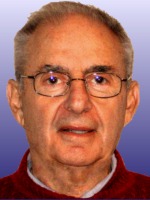
DOV TALES
by Dov Burt Levy

"Why did you become a Zionist, take on Israel
citizenship, and make your home in Israel for half your adult life?
That is the question I have been asked most during the six years I have been
writing this column. I answer now as we celebrate Israel's 60th birthday.
When I graduated Revere High School in 1952, I knew nothing, and I mean nothing,
about Israel or much else. My childhood experience was defined by the poolroom,
racetracks, and working on Revere Beach, not AZA or BBYO, organizations that
might have taught me something.
My parents had begun high school when the 1929 Great Depression hit, never
finished and worked their lives at minimum wage or a few pennies more.
I joined the United States Air Force in November 1952, the day after my 18th
birthday. After training, I spent a year in Greenland where I read my first book
from cover to cover, explored Jewish and American subjects and took classes at
the University of Maryland Overseas Program.
On that slim basis, my Zionist odyssey had begun.
The next year I was stationed in Frankfort where I met survivors who had hidden
during the war or escaped the horrors and returned to Germany. I also had a
sobering, two-day visit to Dachau.
My final 18 months in the Air Force were spent at Orly Air Base in Paris. There,
I met French Jews and received part of an education from two close American
soldier friends, both knowledgeable about Judaism and Israel.
My 24-day furlough in Israel in June 1956 was the high point of my life to that
date.
The country was beautiful, the people kind and helpful. So many of those I met
invited or implored me to settle in Israel. I visited kibbutzim, cities, small
towns, the seacoast and the mountains. I went to an open-air performance of the
British Sadler's Wells Ballet in Tel Aviv and heard my first symphony
performance in Jerusalem.
I was a smitten Zionist.
For the rest of my time in the service, when anyone asked me "what are you?" I
replied, "Israeli." I didn't even know the difference between belonging to a
religious group and being a citizen of a state, or that you could be both.
My request to be discharged in Paris (so I could go directly to Israel) was
denied. I returned to Boston where I had enlisted. I decided to enroll at Boston
University and as often happened in college, marriage and two daughters
followed.
The next 25 years made up my American life. BS degree in high school teaching,
Ph.D. in political science, wonderful jobs with the Anti-Defamation League, the
Michigan Civil Rights Commission, the Justice Department and United States
Environmental Protection Agency, professorships, and two political candidacies.
The next 23 years was my Israel life, working in a kibbutz, hospital and
university.
Now I am a citizen of both the United States and Israel and love both countries
with great passion. America was open and key to fulfilling my potential as an
educated and liberal human being; Israel was welcoming and helped me fulfill
myself as a member of the Jewish people.
In return I have given both countries my best work effort and loyalty. And as it
turned out, one daughter and family lives in America, the other in Israel. With
grandchildren in both countries, my fondest dreams have come true.
When people ask what I think of the Birthright-Israel or the Robert I. Lappin
Foundation programs to send young American Jews to Israel to learn and see the
country, I give high praise. I know that what they get in Israel is the
present-day equivalent of my own initial experience.
Even though the poverty, prejudice and discrimination suffered by American Jews
when I grew up has been replaced by opportunity and accomplishment, l think it
is crucial to have young American Jews know and love Israel, visit often and for
some to choose to make a life there.
Amazing, isn't it, how a personal encounter with the Holocaust, some study, plus
a three-week visit, could plant a Revere, Massachusetts seed in the rocky,
fertile soil of Israel.